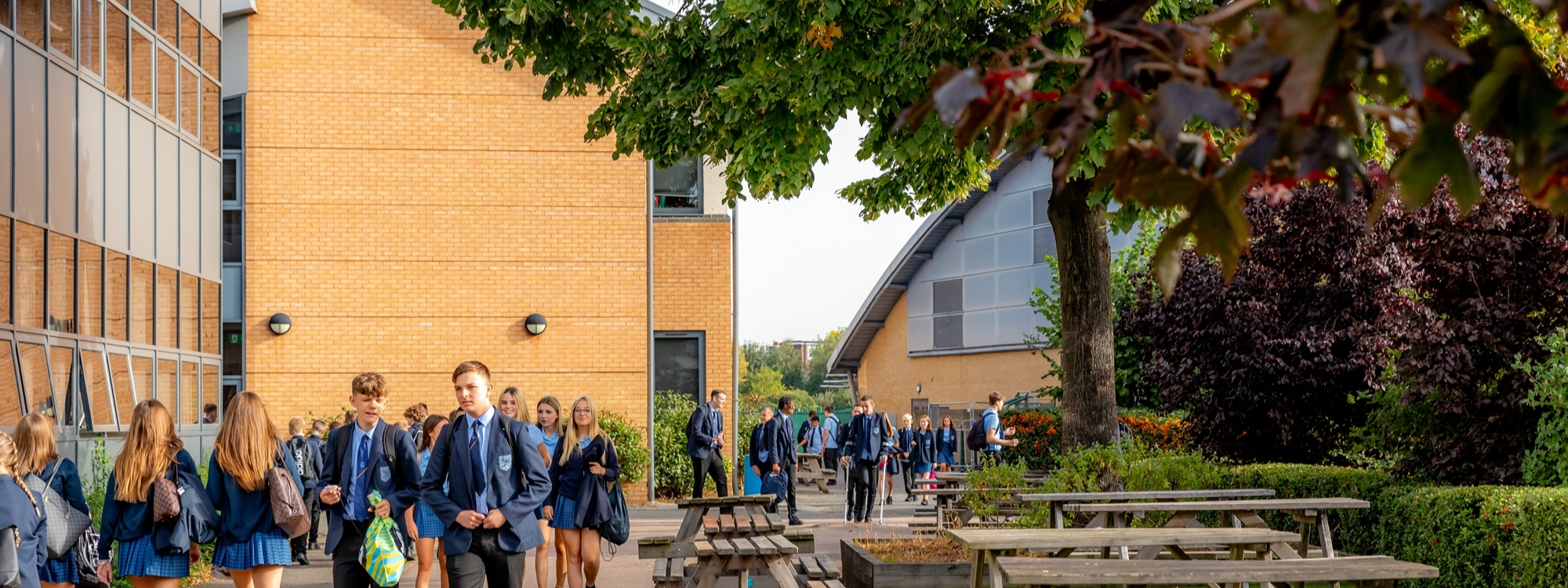- Home
- Curriculum
- Subject Information
- Science
Deputy Head of Faculty
Miss May Naidoo
Vision
To have a rigorous, knowledge-based curriculum with practical science at the heart, which not only builds the foundations of core skills and learning but offers a wide range opportunities where pupils can discover and develop their own potential and skills needed to excel in the modern world
Disciplinary Concepts
- Problem solving
- Analysis
- Cause and consequence
- Models & interpretations
- Calculation and manipulation
- Individual and collective practical work
Big Questions
- How do the sciences link to everyday life?
- What is the universe made of?
- What makes us human?
- How do we beat bacteria?
- Will we cure disease?
- Why do we exist?
- How is balance maintained?
Curriculum Content
Year 7
Skills - starting secondary science, Forces – Relative motion and gravity, Electromagnets – Circuits and static charge, Energy – Energy from fuels & energy stores, Waves – Sound & light, Matter – Particle model & separation, Reactions – Exploring acids & alkalis, Earth – Rock cycle and space, Organisms – Joints, muscles, cells and adaptations, Ecosystems – Food webs and plant fertilisation, Genes – Variation, reproductive systems & developing foetuses
Year 8
Skills - developing scientific skills, Forces – Drag, stretching and pressure, Electromagnets – Fields & electromagnets, Energy – Work, energy & temperature, Waves – Transverse & longitudinal waves, Matter – The periodic table & polymers, Reactions – Exothermic & endothermic reactions, combustion and thermal decomposition, Earth – Atmosphere & global warming, Organisms – Gas exchange, diet & the digestive system, Ecosystems – Aerobic & anaerobic respiration, leaves & photosynthesis, Genes – Natural selection, variance and inheritance
Year 9 AQA GCSE Triple Science
Biology – Cell structure & transport, Cell division, Organising animals & the digestive system, Organising animals & plants
Chemistry – Atomic structure, The periodic table, Structure & bonding, Chemical changes
Physics – Energy, Particle model of matter, Atomic structure, Electricity
Year 10 AQA GCSE Triple Science
Biology – Communicable diseases, Preventing and treating disease, Non communicable diseases, Photosynthesis, Respiration, Human nervous system, Hormonal Coordination, Homeostasis in action
Chemistry – Quantitative chemistry, Electrolysis, Energy Changes, Rates & Equilibrium, Crude Oil & fuels
Physics – Electricity, Forces, Waves
Year 11 AQA GCSE Triple Science
Biology – Reproduction, Variation & evolution, Genetics & evolution, Adaptations, Interdependence & competition, Organising and ecosystems, Biodiversity & ecosystems
Chemistry – Organic reactions, Polymers, Chemical analysis, Earth’s atmosphere, Earth’s resources, Using resources
Physics – Waves, Magnetism and Electromagnetism, Space
AQA A level biology
Year 12
Biological molecules, Cells, Organisms exchange substances with their environment, Genetic information, variation and relationships between organisms
Year 13
Energy transfers in and between organisms, Organisms respond to changes in their internal and external environments, Genetics, populations, evolution and ecosystems, The control of gene expression
AQA A level chemistry
Year 12
Physical chemistry
Atomic structure, Amount of substance, Bonding, Energetics, Kinetics, Chemical equilibria, Le Chatelier’s principle and Kc, oxidation, reduction and redox equations
Inorganic chemistry
Periodicity, Group 2, the alkaline earth metals, Group 7(17), The halogens
Organic chemistry
Introduction to organic chemistry
Alkanes, Halogenoalkanes, Alkenes, Alcohols, Organic analysis
Year 13
Physical chemistry
Thermodynamics, Rate equations, Equilibrium constant Kp for homogeneous systems, Electrode potentials and electrochemical cells, Acids and bases
Inorganic chemistry
Properties of period 3 elements and their oxides, Transition metals, Reactions of ions in aqueous solution
Organic chemistry
Optical isomerism, Aldehydes and ketones, Carboxylic acids and derivatives, Aromatic chemistry, Amines, Polymers, Amino acids, proteins and DNA, Organic synthesis, Nuclear magnetic resonance spectroscopy, Chromatography
AQA A level physics
Year 12
Measurements and their errors, Particles and radiation, Waves, Mechanics and materials, Electricity
Year 13
Further mechanics and thermal physics, Fields and their consequences, Nuclear physics, Astrophysics
BTEC Level 3 Applied Science
Year 12
Unit 1: Principles and Applications of Science (exam)
Biology – cells, tissues, organs, nerve impulses
Chemistry – electronic structure, formulae, bonding, calculations, the periodic table, reactions
Physics – waves and communication.
Unit 2: Practical Scientific Procedures and Techniques (coursework)
Learning aim A: Undertake titration and colorimetry to determine the concentration of solutions.
Learning Aim B: Undertake calorimetry to study cooling curves.
Learning Aim C: Undertake chromatographic techniques to identify components in mixtures.
Learning Aim D: Review personal development of scientific skills for laboratory work.
Year 13
Unit 3: Science Investigation Skills (practical exam)
Planning and carrying out scientific investigations, recording, presenting and analysing data, evaluating and drawing conclusions.
Unit 8: Physiology of Human Body Systems (coursework)
Learning Aim A: understand the impact of disorders of the musculoskeletal system and their associated corrective treatments.
Learning Aim B: understand the impact of disorder on the physiology of the lymphatic system and the associated corrective treatment.
Learning Aim C: explore the physiology of the digestive system and the use of corrective treatment for nutritional deficiency.

 ';
';

